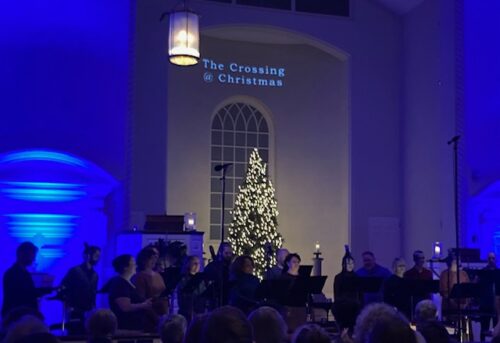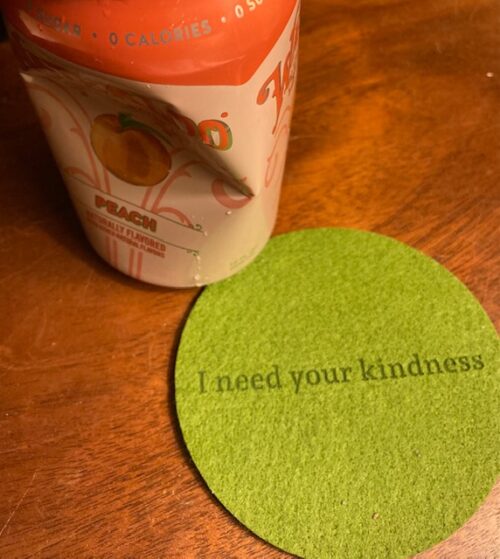Choral writing has become the soul of David Lang’s output – in a highly personal manner that’s firmly based on texts, has a strong sense of its purpose, and has perhaps hit a new level of directness in the world premiere of poor hymnal. The evening-length piece occupied the whole of the “The Crossing at Christmas” concert conducted by Donald Nally, coming at a time when Lang and The Crossing have respectively broadened the philosophical perspectives of our overall musical landscape and will no doubt continue to do so into our troubled decade. The Dec. 17 concert at Presbyterian Church of Chestnut Hill – where I prefer to hear The Crossing – was the third of three performances, the first two presented Dec. 15 by Penn Live Arts at Iron Gate Theatre.

With human beings at war with themselves and civility at an all-time low, Lang’s new piece insists on kindness but does so in a moderately exclamatory fashion, and in the spirit of traditional hymns from which Lang drew on for his piece. He almost sees the hymns as statements of ethics. “The texts,” wrote Lang in the program notes, “represent the beliefs and values that the worshippers all share.”
You sense that he might rather be screaming “Stop violating ourselves and each other!” Among the Bang on a Can founding trio of composers, Julia Wolfe’s unEarth, premiered in June by the New York Philharmonic asks the same question from an environmental standpoint. Michael Gordon’s 2017 Anonymous Man is a saga about a long-time homeless man who lived on his block. But poor hymnal carries its message with minimal artifice, the sort that only a minimalist composer would risk – in a mode of expression that seems embarrassed to rise to exalted heights (even when it occasionally does). On the choral music grandeur scale with the gargantuan Berlioz Requiem at one end, Lang’s poor hymnal would be at the extreme other end. Musically, Lang has said that another springboard for the piece was the New England hymns quoted by Charles Ives. I simply heard Lang’s compositional voice. More of the same? Sort of – but in a good way, in music that doesn’t pull punches but leads listeners inward to the humanitarian core that’s there but not always accessed.
In this 14-section work for unaccompanied chamber choir, Lang addresses poverty at length in his choice of texts that he has massaged into a manner of expression that truly suits his music. The actual meaning can be simplistic in ways that could limit the piece’s future appeal, but words are arranged in a punctuation-free stream so that the sound of the words takes on the quality of incantations that go beyond literal meaning. The opening lines – “ I saw a man… I saw a poor man in a corner with no food” – go on repeatedly, always with variations that give the piece a forward motion while seeming to meditate in the same spot. A similar focal point in Lang’s breakthrough choral work the little match girl passion has a girl in a corner with no food, invoking a sense of moral responsibility to those seemingly unable to help themselves.
But the poor hymnal texts have no protagonist, no face, so to speak. The music has a kind of emotional neutrality that comes from a hymn-like simplicity but lack of what we commonly call functional harmony. The piece has momentum but the phrases don’t point toward in typical directions or express much pathos – and maybe no pathos at all. Then there’s Lang’s use of silence. The measured manner of traditional hymns have a clear conclusion of any given verse before starting the next. It’s here where Lang leaves extra-long gaps for one’s own thoughts to fill the void. While the little match girl passion draws you into the story, poor hymnal is a still and quiet mirror. The piece allowed me to take my own temperature on any number of issues, since it moves beyond poverty and suggests that social responsibility isn’t just an obligation, but a matter of acknowledging the invisible networks within our world. A movement titled “what is mine” had texts drawn from Elizabeth Warren, Barack Obama and Saint Basil that shows Lang turning over and over the idea that anything we create isn’t a solo act (to put it bluntly). To quote: “what do I have that’s mine alone? what do I know I that learned myself? what have I made that I made by myself? what have I done without the help of others?”
One must ask, though, was Lang creating art or writing an Op-Ed New York Times piece with singing attached? Well, the message does take clear precedence over everything, though not all the time. Cultivated, masterful counterpoint is sometimes heard, along with diverse, thoughtful groupings of voices, including some lovely vocal solos that one might compare to plainchant if they didn’t have the contours of modern lyricism. By the end, the piece returned to the “I saw a poor man” text of the beginning but with Tolstoy contributing to the coda movement titled “where charity is.” So there’s no denying that the message was the reason for the piece’s existence. But would we listen without the music – or the communal setting of a concert? The take-home treat was the printed program including a handsome green coffee-table coaster on which was printed “I need your kindness.” A daily reminder?

>

